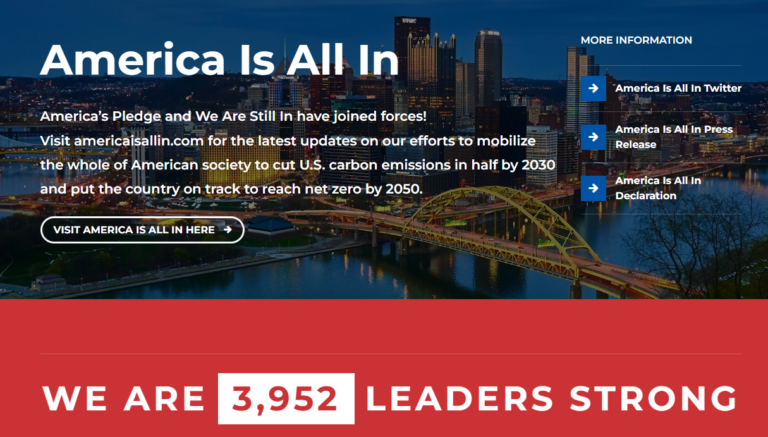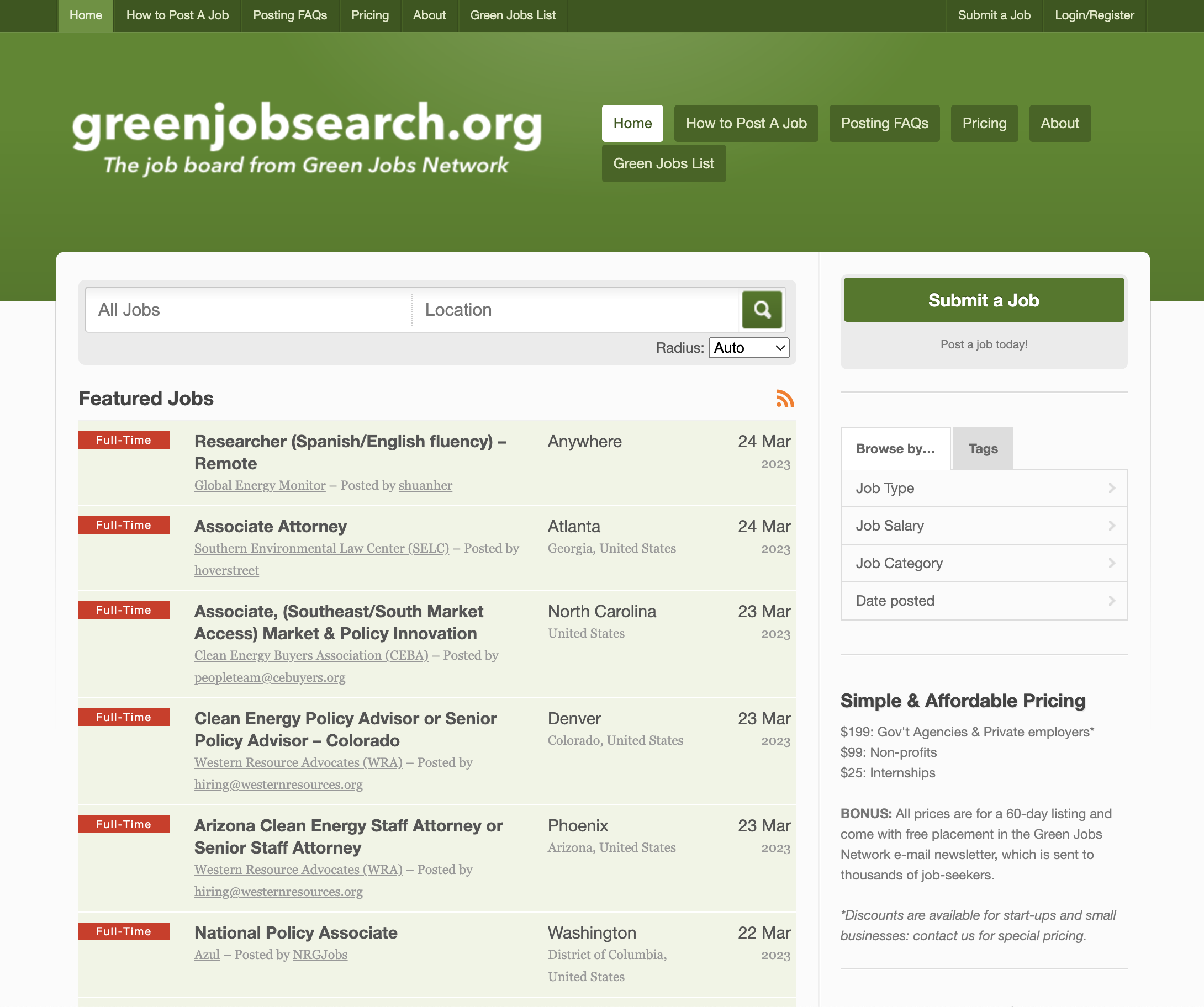In the past, there was a call to create five million green jobs. Ten years later, where are we at? What are some examples of green jobs in 2023? How many jobs are there?
We’ll dig into these questions and more. But first, let’s define a green job.
What is a green job in 2023?
A green job is:
A job that helps produce a good or service that benefits the environment or conserves natural resources. This good or service could be renewable energy, pollution reduction, an organic product, or environmental compliance.
A job that involves reducing the environmental impact of an organization’s production processes. Responsibilities might include establishing cost-cutting initiatives such as energy efficiency, renewable energy sources, waste management, or resource conservation.
These jobs exist in emerging green sectors and in traditional sectors such as manufacturing, technology, insurance, and state and federal government.
How many green jobs are there?
According to RealClear Energy, there has been an increase in green positions, and it is projected that there are to be more. The numbers began as low as one percent in 1970, and have climbed their way up to 5 percent as of 2020. This number is estimated to grow to 14 percent by 2030.
What are some examples of green jobs?
Sustainability specialist
Sustainability specialists address organizational sustainability issues, such as waste management, green building practices, and green procurement plans.
Sustainability specialist salary (2023): $49,600
Recommended education: Bachelor’s degree
Climate change analyst
A climate change analyst researches and analyzes policy developments related to climate change and makes recommendations for legislation, awareness campaigns, and fundraising approaches.
Climate change analyst salary (2023): $77,400
Recommended education: Master’s degree
Energy auditor
Energy auditors conduct energy audits of buildings, building systems, or process systems.
Energy auditor salary (2023): $62,700
Recommended education: Bachelor’s degree
Chief sustainability officer
Chief sustainability officers communicate and coordinate with management, shareholders, customers, and employees to address sustainability issues and enact a corporate sustainability strategy.
Chief sustainability officer salary (2023): $120,600
Recommended education: Master’s degree
Environmental economist
An environmental economist conducts economic analyses related to environmental protection and use of the natural environment and quantifies the benefits, costs, incentives, and impacts of alternative options.
Environmental economist salary (2023): $99,000
Recommended education: Master’s degree (or higher)
Green jobs or sustainability jobs?
Green jobs are very much a central and growing piece of the modern economy. More than 3.2 million people are employed in clean energy in the US—that’s 2.5 times more than those employed in fossil fuels. Wind and solar are the two industries propelling this job creation. The US Bureau of Labor Statistics predicts they will be the two fastest growing sectors through 2026.
However, within the corporate business community, the conversation has shifted over the last decade from green efforts to broader sustainability ones. According to Talal Rafi, a World Bank Ambassador on climate change, this switch is important because “Economic, social and environmental sustainability is a must in today’s business environment.” It’s a must because following this sustainability track allows for there to be an increase in efficiency and brand value, it brings in valuable talent, meets consumer demands, and creates new opportunities.
How are sustainability jobs different?
Green jobs largely focus on reducing environmental impact. Sustainability jobs involve balancing the triple bottom line—people, planet, and prosperity. Sustainability professionals constantly have these three things top of mind, focusing on the bigger picture and how organizations fit into and impact communities and the environment. In that sense, any job can be a sustainability job. For professionals in these roles, green and sustainable efforts might only be one part of the work they do.
Sustainability has become a field that encompasses a wide variety of professionals, including:
- production supervisors,
- accountants,
- US military service members,
- insurance brokers,
- business managers,
- public relations specialists,
- science teachers,
- entrepreneurs,
- chemists,
- graphic designers,
- urban and regional planners,
- risk management specialists,
- compliance managers,
- supply chain managers, and
- marketing specialists.
See the 2023 average national salaries and recommended education for specific positions on the US Bureau of Labor Statistics website.
Get Program Guide
Learn more about our 100% online degree and certificate programs.
How do I get a green or sustainability job?
Get the right education
To become a sustainability professional, you should have a broad education in three main disciplines: business strategy, economics, and environmental science. You’ll also need skills and knowledge in several subdomains, such as marketing, accounting, law, communications, and management. A degree in sustainable management provides this education.
University of Wisconsin offers online bachelor’s, master’s, and certificate programs that build skills and knowledge in sustainable business.
Gain job experience
It’s crucial that your resume shows experience building and implementing sustainable initiatives. This isn’t as intimidating as it sounds. Many students in the UW Sustainable Management programs start with small initiatives in their workplaces and grow from there. Also, every student must design and complete a capstone project at a real organization. The capstone provides an opportunity to put all the passion and skills you built in the degree program to the test. Plus, it’s a networking opportunity that can lead to job opportunities.
Which companies are focused on sustainability?
Private companies and state and local governments are adding more emphasis on corporate sustainability initiatives such as greening supply chains, adding renewables, and reducing waste.

We Are Still In is a coalition of nearly 4,000 governments and businesses that have pledged to remain committed to the Paris Climate Agreement. If you’re looking for local organizations that value sustainability, this is a good place to start. You can search by sector or state. For example, in Wisconsin, Johnson Controls, Dane County, Fiskars, and Kohler Co. are among the signatories.

You can also search for current openings on the Green Jobs Network.
What’s next?
Start exploring how you can get involved in sustainability with the UW Sustainable Management programs. Or, reach out to an enrollment adviser to get started on a degree in Sustainable Management today by calling 608-800-6762 or emailing learn@uwex.wisconsin.edu.










